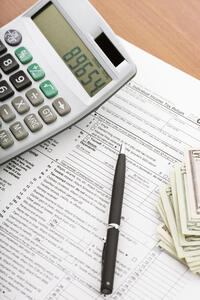 When you are struggling to pay your debts, the idea of losing tax refunds after bankruptcy is frightening. Some people rely on their tax refunds each year to make necessary repairs to their home or vehicle, pay for medical checkups or buy clothes and other necessities for their children. We often have clients say that they want to put off filing a bankruptcy case because they are worried what will happen to their tax refunds after bankruptcy.
When you are struggling to pay your debts, the idea of losing tax refunds after bankruptcy is frightening. Some people rely on their tax refunds each year to make necessary repairs to their home or vehicle, pay for medical checkups or buy clothes and other necessities for their children. We often have clients say that they want to put off filing a bankruptcy case because they are worried what will happen to their tax refunds after bankruptcy.
We want to assure you that you do not need to wait to find the relief you need from your debt problems. In most cases, you can find the relief that you need NOW and keep your tax refunds. While some debtors may lose their tax refunds after bankruptcy for the year the bankruptcy case is filed, the vast majority of people will receive their tax refunds.
Tax Refunds After Bankruptcy in a Chapter 13 Case
In most Chapter 13 cases, the debtors keep their tax refunds after bankruptcy; however, there are cases where the debtors may need to pay a portion of their tax refunds to the trustee as part of their bankruptcy plan. The attorney cannot be completely sure about the refund until he has thoroughly reviewed your specific financial situation and devised a Chapter 13 plan that resolves the issues at hand.
For the debtors that do pay their tax refunds after bankruptcy to their Chapter 13 trustee, the debt relief they receive from filing the bankruptcy case usually far outweighs the issue of the tax refunds.
Tax Refunds After Bankruptcy in a Chapter 7 Case
In Chapter 7 cases, there are very few instances where a debtor will lose his or her tax refunds for the year in which the bankruptcy case is filed. In almost all Chapter 7 bankruptcy cases, the bankruptcy exemptions are sufficient to protect any anticipated tax refunds that the debtor may be receiving during tax time. During the bankruptcy consultation, the attorney reviews the debtor’s assets, including anticipated tax refunds, to determine if any of the assets are in jeopardy. If so, the attorney will explain to the debtor what his or her options are with regard to filing a bankruptcy case right away. In some cases, the benefits of filing the Chapter 7 case right away outweigh the potential of losing a portion or all of your tax refunds for the year.
The amount of your tax refunds that are part of the bankruptcy estate will depend on the date your bankruptcy petition is filed and the available exemptions. Depending on the assets that you have, the bankruptcy exemptions may only protect a portion of the tax refunds; therefore, you will lose the portion that is not protected by the exemption. Another issue is when your bankruptcy case is filed. If you file your case prior to the end of the calendar year, the trustee is only entitled to a pro-rata share of the anticipated tax refunds based on your filing date, provided the tax refund is not protected by an exemption. If you file after the first of the year, the trustee may be entitled to the entire tax refund if it is not protected by an exemption.
However, we must stress that in almost all cases, the debtor keeps their tax refunds after bankruptcy is filed. In order to determine if your tax refunds might be in jeopardy after filing bankruptcy, schedule a free consultation to meet with one of our bankruptcy attorneys. It is likely that your tax refunds will be safe and you can file bankruptcy immediately to resolve your debt problems, stop creditor harassment, and take your life back once and for all.



